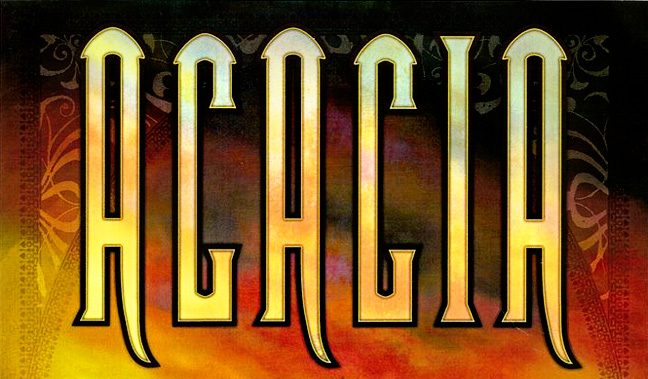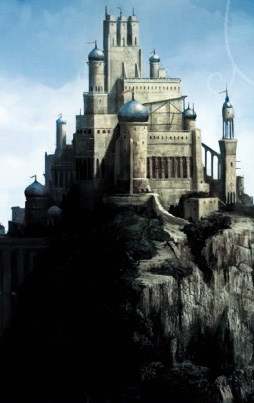
“Of course a thing that could be made into a weapon would be made into a weapon. It did not matter if it was a thing of beauty. It did not matter if their mission was holy and benevolent. It only mattered that The Song could be twisted to serve human greed. If that was so, it was only a measure of time until someone grasped for it.”
The Acacia Trilogy
By David Anthony Durham
Trade Paperback
Publisher: Anchor/Doubleday
The War with the Mein: 0307947130
The Other Lands: 0307947149
The Sacred Band: 0307739600
That quote stood out to me in the final volume of The Acacia Trilogy. I wouldn’t say it’s the theme of the series distilled down into four lines of prose, but it is pretty representative of one of the many contained there in. On the surface, David Anthony Durham’s trilogy, and first foray into genre fiction, looks like run of the mill epic fantasy. His protagonists are four royal children whose father is struck dead in the opening moments of the first novel, The War With the Mein, forcing them to scatter, grow to adulthood, and return to restore peace to the Akaran Kingdom and the Known World. It’s not quite the farm boy prophesied to save the world, but it’s not far off.
I began with this quote not because of its significance to the overall message of Durham’s work, rather because it signifies an attempt to speak to something larger than the narrative itself. I suspect that many reviews written about Durham’s series will laud it for its progressive nature (edit: after writing this post I read Neth Space’s review that does just that) and rightly so.
At the start of the story, the Akaran kingdom has been ruled by a family for generations. Their power is maintained through an arrangement with a powerful entity across the sea. In exchange for a drug called mist, the Akaran’s offer up a quota of children for an unknown purpose. Through mist they create a pliable population to work the mines and fields that sustain their reign. Unlike so much fantasy, the series ends not with the status quo (i.e. – the evil defeated), but with legitimate change and progression toward something better, brought about by the will of the characters and their own growth. Suffice to say there’s a great deal to chew on with regard to Durham’s social commentary.
While this discussion isn’t necessarily my central focus, I mention it to highlight the depth achieved by Durham in a less than expansive canvas. The three book series, while historically the standard in genre fiction, has gotten complicated. Epic fantasy has become unwieldy. Robert Jordan, George R.R. Martin, Joe Abercrombie, Raymond E. Feist, Terry Brooks, and all the rest keep writing in the same world. The result is a massive backlog of story that encourages readers to either plow ahead without knowing what’s come before or invest gads of time and money catching up. This is fine, they’re great authors who write great books. Unfortunately, I’ve a belief that these types of fantasies have bread an inherent attempt to find the next Wheel of Time or A Song of Ice and Fire.
As a result, we have Brandon Sanderon’s Stormlight Archive, Peter V. Brett’s Demon Cycle, and Daniel Abraham’s The Dagger and the Coin. Not because readers want length; because they crave the sweeping canvas, the endless scope, and the breadth of change. Packing more into three volumes than many authors can pack into ten, Durham’s Acacia bucks that trend to return epic fantasy to its structural roots, embracing tropes, while simultaneously moving afield.
One of the places he most manipulates expectations is in his approach to characters. Many modern fantasies, from the Joe Abercrombies and K.J. Parkers of the world, present the individual, heroic or otherwise, as a self-interested actor. To those authors, morality is a judgement after the fact. Actions can be interpreted to be good or evil, heroic or cowardly, but the motivations behind them are always inherently selfish. This is juxtaposed by the traditional fantasy character who sacrifices himself for the greater good, or sacrifices everyone for his own gain.
In Acacia, Durham handles it different still. Morally relativistic, yes, but with an intrinsic belief that most people want to do the right thing. Even Durham’s “evilest” characters act in (what they’ve convinced themselves to be) the best interests of others. To them, the ends always justify the means. Layered there is an argument that power corrupts in so far as it blinds the individual to the consequences of action. It’s an interesting conversation at Abercrombie and Parker who write without a recognition of good and evil. To them all motivations are the same, only outcomes differ, interpreted as right or wrong objectively by others. Durham recognizes goodness in all its forms, most especially when evil is done in its commission.

It’s all of these reasons that The War With the Mein was the novel that brought me back to fantasy. What made me really sit up and take notice was the subtext — the frank discussion of social class, duty, family, and morality. There are times when Durham’s characters become Mary Sues. And moderate levels of deus ex machina rear their head from time to time. For me, these moments are easily pushed aside, ignored in favour of the poignant story, memorable characters, and vast change ushered in with every page.
Published by Anchor, a Doubleday imprint and publisher of mainstream fiction, The War With the Mein generated a lot of early buzz, including a John W. Campbell Award nomination for Best New Writer for Durham. Alas, with a two year delay between books and a first instalment that lacked obvious newness, some readers moved on. That was a mistake and George R. R. Martin agrees with me, recently blurbing the series’ reissue in trade paperback.
The new editions of the trilogy come with Martin’s recommendation, but also 14,000 words lighter. Responding to critics and readers who found the early part of The War With the Mein slow, Durham tightened things up, cutting exposition and redundancies without changing the plot or characters. I think it speaks to the truth that each novel in the series improved as Durham did as a writer.
I still worry that not enough readers will find Acacia. I hope this review will help in that regard. It rekindled in me a love of fantasy and for that it will always hold a place in my pantheon. More importantly though, it’s a series I’ll pass it on to my children for the honesty that David Anthony Durham brings to the Known World. I hope it isn’t the last we’ve heard of him in genre fiction.


I loved Durham’s first book and the only reason I haven’t read the second one yet is that I received it in the mail while I was in the middle of a couple books and I have to finish them before I jump to the second boo. This doesn’t diminish my anticipation for it though. Great writing with a great, unique story.
I didn’t know about the reediting, that’s interesting. I read the first book but haven’t gotten around to 2 & 3 yet. I think I’ll pick up the new Acacia and try it out!
Thanks, Justin.
This is a series sadly not even yet on Mount Toberead (I thought it was, but it turns out it is not).
One of these days I need to change that…
I had a really hard time getting into the first book in the series. It had so many superficial similarities to other work and took so long establishing things before it got to the heart of what the series was going to be about that I ultimately gave up on it.
I have a tough time justifying spending money a second time on a book I wasn’t crazy about, but the idea of a version 14,000 words shorter is very intriguing. Especially since I’ve heard nothing but praise for this series.
Really nice review, Justin. His first book was the first thing I read after a long hiatus from fantasy lit. I think it was a full-page ad in Locus at my local library that brought it to my attention. I feel like it’s an under-appreciated series, too.
I didn’t find Durham’s style agreeable at all. As mentioned it felt blockish and slow in the buildup for the first novel only to set off with a great anti-climax towards the end and then rushed through to try and set things up for the great return in the 3rd novel. And while I’ve only finished the 2nd book I have no real interest in going back in for a third time. It felt too much like going back to YA, or Eddings’ Belgariad for that matter which, granted, made me fall in love with the genre in the first place.
I think there’s entirely to much hype for a writer who, at least to me, is quite average. There were some moments where I couldn’t put the book down, and the development of both Corinn and Aliver was something I found neatly done, and even the historical setup was a positive but to me the negatives far outweigh the positives. I might do a re-read once I get my hands on the third installment but as Benj I’m fairly sceptical of buying a book which didn’t really do much for me the first time around.
There are loads of books out there that I’d recommend before this one.
[…] Review: Acacia Trilogy by David Anthony Durham, read by A Dribble of Ink […]
I’m with those having reservations about it. I haven’t completed the first book but I’m already disappointed. At first I wasn’t impressed with the style but then I noticed a certain meditative quality about it that is lacking in modern fantasy and I liked it for a while. It’s also very well written on a technical level. But then it deteriorated into a standard-ish historical political fantasy with exaggerated violence and super-nazis that’s trying too hard to be taken seriously. As a homework in writing epic fantasy it would have to be given a very good grade, but it feels no more than a very good homework.
BTW, with all this criticism in mind I object to categories like “Mary Sue”. I don’t find it appropriate in many cases. Goodness or skill doesn’t make a “Mary Sue”. It would have to be cheesy as well and no integrity, created merely for the audience’s pleasue (HIMYM’s Ted Mosby is modern Mary Sue #1).
This is exactly the forced “seriousness” that leads to such cliché “political complexity” and seeing nazis everywhere in order to make an impact…